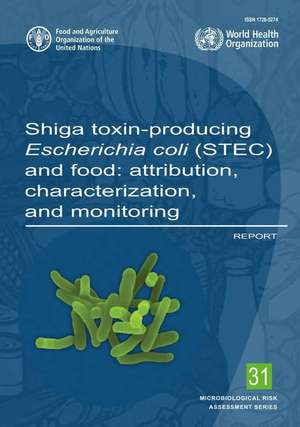Shiga Toxin-Producing Escherichia Coli (Stec) and Food
Autor World Health Organizationen Limba Engleză Paperback – 22 ian 2019
Preț: 339.58 lei
Nou
Puncte Express: 509
Preț estimativ în valută:
64.98€ • 67.46$ • 54.19£
64.98€ • 67.46$ • 54.19£
Carte indisponibilă temporar
Doresc să fiu notificat când acest titlu va fi disponibil:
Se trimite...
Preluare comenzi: 021 569.72.76
Specificații
ISBN-13: 9789241514279
ISBN-10: 9241514272
Pagini: 172
Greutate: 0.37 kg
Editura: World Health Organization
ISBN-10: 9241514272
Pagini: 172
Greutate: 0.37 kg
Editura: World Health Organization
Notă biografică
World Health Organization is a Specialized Agency of the United Nations, charged to act as the world's directing and coordinating authority on questions of human health. It is responsible for providing leadership on global health matters, shaping the health research agenda, setting norms and standards, articulating evidence-based policy options, providing technical support to countries, and monitoring and assessing health trends.
